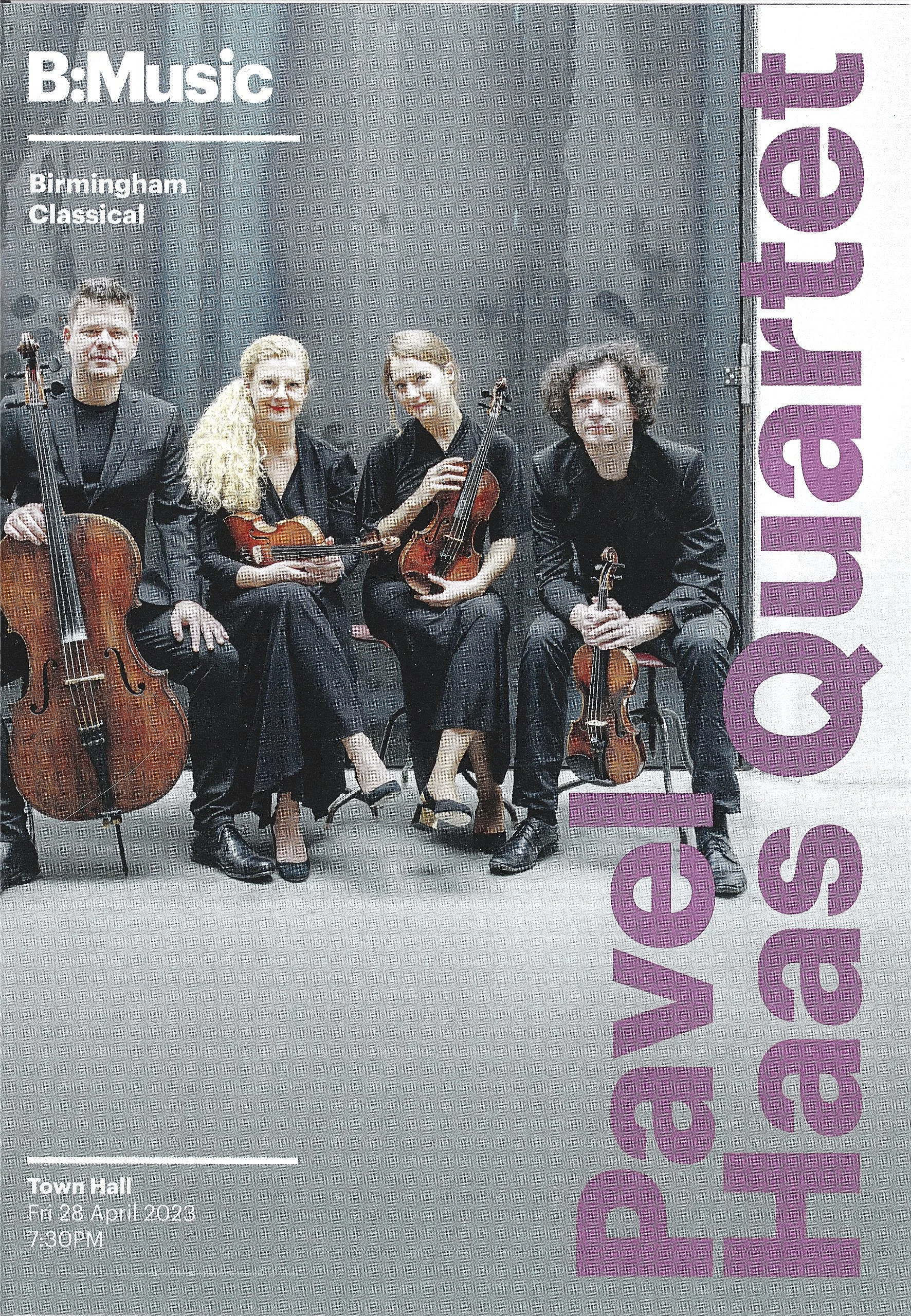Pavel Haas Quartet (on tour) Town Hall, Birmingham, April 28th 2023: 5***** David Gray & Paul Gray
- Schubert - Quartet in G, D887 (1826)
- Dvorak - Quartet No 13, Op. 106 (1895)
Our colleague, William Ruff, reviewed this outstanding performance by the Pavel Haas Quartet @ Birmingham Town Hall, the night before ourselves at Lakeside, Nottingham (April 27th, 2023). In terms of what we might have to say about the repeat of this remarkable programme in Birmingham, has already been perfectly & precisely expressed in William's Review. Here's a link to that Review: Pavel Haas Quartet. Lakeside, Nottingham. April 27, 2023. 5*****. William Ruff –ReviewsGate
Here are a few of our additional, complimentary thoughts on the specifics of the Pavel Haas Quartet's repeat performance in Birmingham Town Hall as part of the B: Music Classical Series.
Schubert's last Quartet in G major no.15 is a monumental work. The first movement is extraordinarily long and has a complex formal layout. The Pavel Haas, have a compellingly eurythmic interplay with one another, and perfect synchronisation of rhythmic and contrapuntal detail, and they skilfully guided us through the formal complexity, making it come alive with total comprehensibility.
As times it was as though the players were physically dancing with one another. Indeed, it is amazing how 'cellist Peter Jarušek dangerously danced around in his chair, rarely looking at his music; his eyes, body and whole soul somehow totally immersed, conjoined and at one with his fellow players.
Schubert wrote this quartet in 1826, two years before the end of his tragically short life at the age of 31 in 1828. He died of the horrors of the syphilis he had contracted some years earlier around the end of 1822. One has to ask if the progression of the disease - which can so aggressively attack the brain and notions of "sanity" - had a role to play in the construction of this work, and in particular the first movement.
In her book, Schubert: The Piano and Dark Keys. Schubert scholar, Elizabeth Norman McKay, speaks of a similarly complex - and to the ears of the public, and editors of the day - bewildering work by Schubert, the D minor Piano Sonata in A minor (D.784) - hear it played here by Radu Lupu - Schubert: Sonata in A minor, D. 784 (Radu Lupu) - YouTube) McKay says:
"Towards the end of 1822 ... Schubert was very sick, having contracted the syphilis that inevitably was to effect the remainder of his life: his physical and mental health, and the music he was to compose..........He was: sick, [often] living in his father's home, much in need of money, and shattered by what had happened to him".
In the first movement of the quartet, rather like the third movement of the piano sonata, the first subject area is incredibly angry and muscular, with an almost demonic harmonic-rhythmic drive. The music feels on the very edge of breaking point, perhaps even of a descent into total madness. And then, suddenly, the second subject area strikes through, and this is a total contrast: full of sweet, melodic, song-like beauty; translucent passages and limpid textures.
Of course, the venomous first subject material keeps breaking through, sweeping any sweetness away. The contrasts in this long and complex movement are so very astonishing; it is almost like a kind of musical schizophrenia. One can only wonder, given that by 1826 Schubert had been living with syphilis for
almost four years, if this dramatic - and at times desperate-sounding battle between an angry darkness alternating with snatches of salvific light - is borne of the battle raging inside the composer's degenerating psyche.
The Pavel Haas present this with utter perfection; at times it is almost too painful to experience. Just breath-taking. No wonder this amazing quartet are considered one of the very greatest in the world today.
After the interval the band played Dvorak's glorious Quartet No 13, Op. 106 of 1895. This was a lovely contrast to the Schubert, and with the light and colour of his (mostly) happy time in New York, and of
his return to his much-loved Bohemian homeland. We have snatches of the kind of "Americana" we hear in Dvorak's famous American Quartet, and also the quasi-modal melodies of Bohemian folksong.
There is a terrific use of modulations (changes of key) to the flattened third and flattened sixth degrees of the tonal scale, and also some fantastically daring, upward chromatic modulations, which on occasions take the music far, far away from the tonic key, and to more exotic tonal climes.
Again, a truly stunning performance by this stunning quartet. It is at times like this that one feels so utterly humbled and swept away by the utter genius of both the players and their uniquely personal interpretations of some of the world's greatest chamber music. Bravissimo, Pavel Hass!
Pavel Haas Quartet: * Veronika Jarušková, violin * Marek Zwiebel, violin * Dama Zemstov, viola * Peter Jarušek, cello
